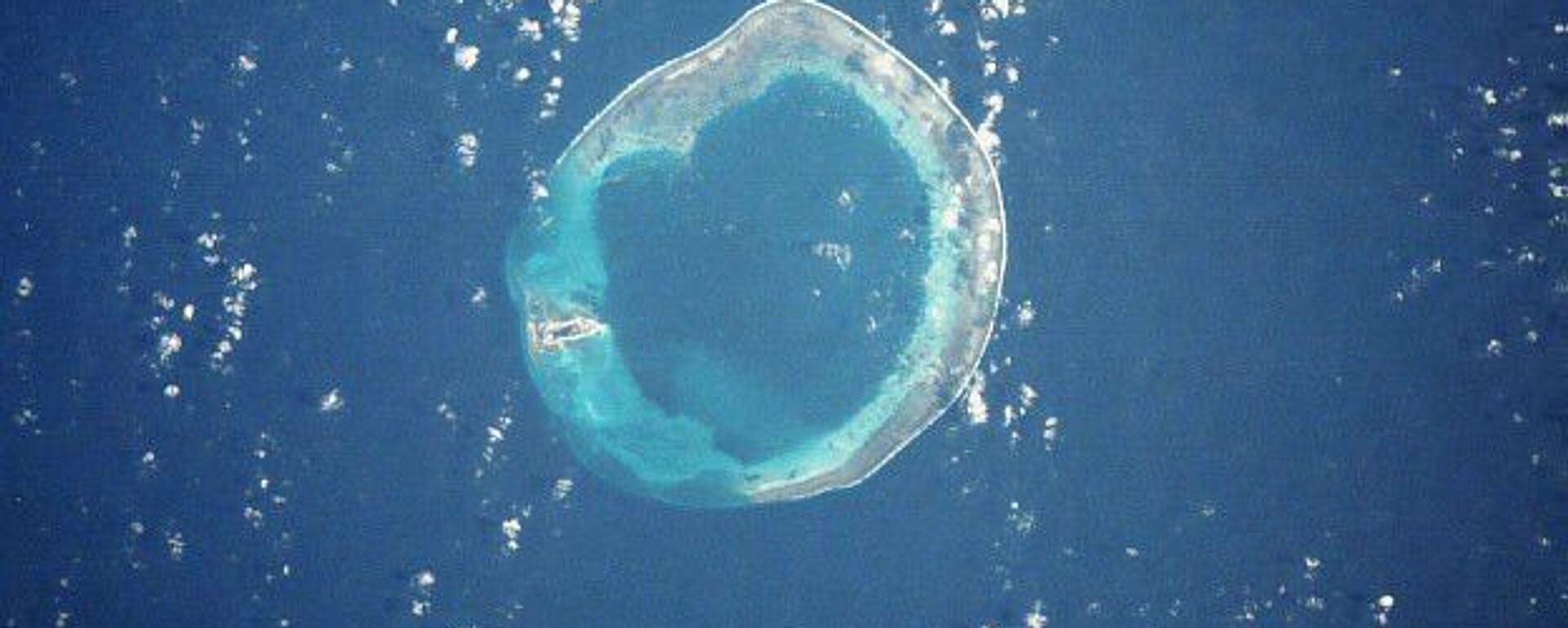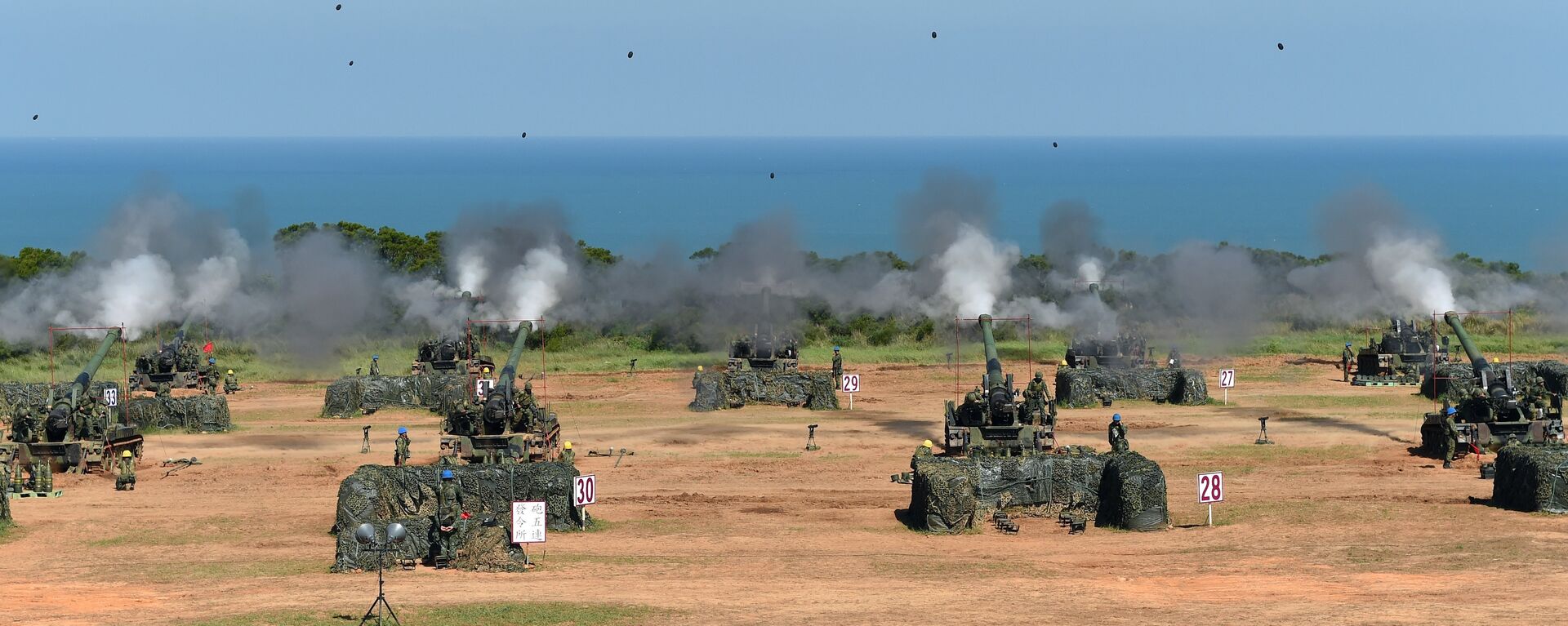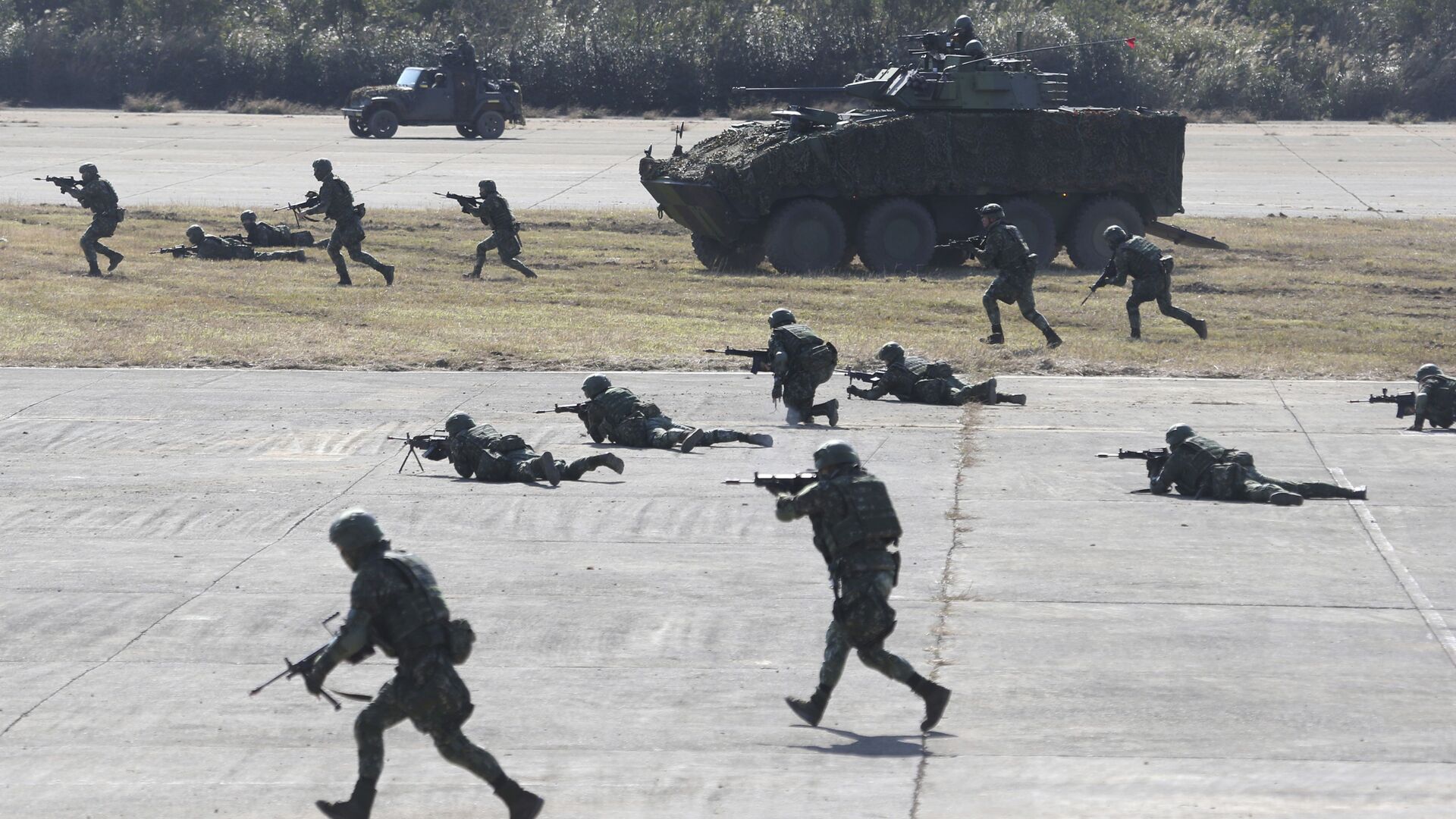https://sputnikglobe.com/20211109/us-troops-have-been-secretly-stationed-on-taiwan-since-as-far-back-as-2008-pentagon-data-shows-1090598800.html
US Troops Have Been Secretly Stationed on Taiwan as Far Back as 2008, Pentagon Data Shows
US Troops Have Been Secretly Stationed on Taiwan as Far Back as 2008, Pentagon Data Shows
Sputnik International
Last month, US media reported that small numbers of US Marines and special operations soldiers have been secretly training troops in Taiwan for at least a... 09.11.2021, Sputnik International
2021-11-09T15:10+0000
2021-11-09T15:10+0000
2023-06-19T12:43+0000
america
china
taiwan
https://cdn1.img.sputnikglobe.com/img/07e5/03/05/1082264787_0:160:3073:1888_1920x0_80_0_0_1c682a151c75afe0ad7690102402d9d7.jpg
The US has kept small numbers of troops deployed on Taiwan since at least 2008, internal Pentagon data has revealed.According to the military’s personnel, workforce and publications files, which includes information on active duty service member strength, and military and civilian personnel operating in the United States and abroad, the US troop deployment on Taiwan goes back to the twilight of the George W. Bush administration.Unnamed sources said to be familiar with the data confirmed the troops’ presence on the island to Foreign Policy – the first publication to report on the figures. Two sources said that although the Bush and Obama-era deployments appear to have been limited "mostly" to the training of their Taiwanese counterparts in the use of American-made weapons, the deployments expanded under Donald Trump and Joe Biden to include Special Forces and Marines in a bid to “harden” Taiwan and prepare it for a possible Chinese amphibious invasion.Trump fired Bolton in 2019, calling him “one of the dumbest people in Washington,” but did not diminish the stepped-up presence in Taiwan.The 2008 data also curiously showed that three US Marines somehow remained stationed in the Union of Soviet Socialist Republics, despite the country’s collapse in late 1991. Another 29,510 troops were stationed in regions "unknown."Along with the steady deployment of US troops on Taiwan across four separate administrations, data appeared to show a small jump in the number of Marines deployed to the island this year. In June 2021, for example, figures showed that 30 active-duty troops and 15 Pentagon civilian employees were working on the island, among them 23 Marines.Several weeks after the Wall Street Journal first reported in early October that a limited contingent of about two dozen US Marines and Special Operations troops were stationed on Taiwan, Taiwanese President Tsai Ing-wen confirmed the troops’ presence, sparking fury from Beijing, which considers the island an integral part of the People’s Republic.Last week, Taiwan also revealed that some 40 of its troops were in Guam training with US forces.Asked to comment on the troop deployments, a Pentagon spokesman said that US support for Taiwan was “aligned against the current threat posed by the People’s Republic of China,” and claimed that it was “in line with our commitments” under both the Taiwan Relations Act and the One China Policy.Washington has long maintained that its troops left Taiwan for good in 1979, when the US and China formally established diplomatic relations, and America began formally adhering to the One China Policy – which recognises the PRC as the only sovereign state under the name China, and Taiwan’s status as "unresolved" amid Beijing’s claims to the island.Beijing has blasted the US over revelations that its troops remain present in Taiwan, urging Washington to adhere to the One China Policy and the provisions of the three US-Chinese communiques on diplomatic ties negotiated between 1972 and 1982.‘Getting on the Mainland’s Nerves’Last month, when asked in a briefing about the Chinese position on US troops on Taiwan, Chinese Foreign Ministry spokesman Wang Wenbin stressed that Beijing “strongly” opposes “any official and military contacts between the US and Taiwan, as well as US interference in China’s internal affairs.”Chinese media went further, warning that the People’s Liberation Army could carry out airstrikes to “eliminate those US invaders” and accusing Washington of “playing with fire” by trying to “get on the mainland’s nerves” and risking a military conflict.The revelations on the troops, combined with regular US "freedom of navigation" missions through the Taiwan Strait, and President Biden’s remarks about being committed to aid Taiwan should Chinese “bad guys” attack the island, have dramatically escalated tensions between Washington and Beijing.Chinese authorities expect the island’s eventual peaceful reunification with the mainland in line with the "One Country, Two Systems" model applied to Hong Kong in 1997. Last month, President Xi Jinping reiterated that reunification would “definitely” take place, and suggested that “to achieve the reunification of the motherland by peaceful means” would be “most in line with the overall interests of the Chinese nation, including our compatriots in Taiwan.”Taiwan has been ruled by a separate government since 1949 – when nationalist Kuomintang forces which lost the Chinese civil war to the communists fled to the island. While the Kuomintang party – which ruled the island throughout the second half of the 20th century and worked to establish economic ties and informal diplomatic links with Beijing in the 1980s and 1990s, generally favours reunification, the current ruling party, Tsai’s Democratic Progressives, are aggressively opposed to the idea. Since coming to power in 2016, the party has sought to strengthen ties with Washington.
https://sputnikglobe.com/20211107/us-media-reveals-how-china-could-test-biden-on-taiwan-without-starting-full-scale-war-1090549515.html
https://sputnikglobe.com/20211030/us-media-acknowledges-ugly-reality-that-america-could-lose-war-with-china-over-taiwan-1090349874.html
china
taiwan
Sputnik International
feedback@sputniknews.com
+74956456601
MIA „Rossiya Segodnya“
2021
News
en_EN
Sputnik International
feedback@sputniknews.com
+74956456601
MIA „Rossiya Segodnya“
Sputnik International
feedback@sputniknews.com
+74956456601
MIA „Rossiya Segodnya“
america, china, taiwan
US Troops Have Been Secretly Stationed on Taiwan as Far Back as 2008, Pentagon Data Shows
15:10 GMT 09.11.2021 (Updated: 12:43 GMT 19.06.2023) Last month, US media reported that small numbers of US Marines and special operations soldiers have been secretly training troops in Taiwan for at least a year, potentially in violation of agreements between Washington and Beijing. Taiwan’s president later confirmed the deployment, prompting Chinese media to warn that the issue could spark a war.
The US has kept small numbers of troops deployed on Taiwan since at least 2008, internal Pentagon
data has revealed.
According to the military’s personnel, workforce and publications files, which includes information on active duty service member strength, and military and civilian personnel operating in the United States and abroad, the US troop deployment on Taiwan goes back to the twilight of the George W. Bush administration.
A downloadable Excel file for September 30, 2008 lists three Navy and four Air Force personnel to have been stationed on Taiwan at the time.
Unnamed sources said to be familiar with the data confirmed the troops’ presence on the island to Foreign Policy – the first publication
to report on the figures. Two sources said that although the Bush and Obama-era deployments appear to have been limited "mostly" to the training of their Taiwanese counterparts in the use of American-made weapons, the deployments expanded under Donald Trump and Joe Biden to include Special Forces and Marines in a bid to “harden” Taiwan and prepare it for a possible Chinese amphibious invasion.
One unnamed former official said US troops working out of America’s de facto embassy have been helping the Taiwanese to locate potential Chinese landing sites and fortify these positions “for years.” The same official said the decision to beef up US troop numbers under Trump was carried out on the insistence of John Bolton, his former National Security Advisor.
Trump fired Bolton in 2019, calling him “one of the dumbest people in Washington,” but did not diminish the stepped-up presence in Taiwan.
The 2008 data also curiously showed that three US Marines somehow remained stationed in the Union of Soviet Socialist Republics, despite the country’s collapse in late 1991. Another 29,510 troops were stationed in regions "unknown."
Along with the steady deployment of US troops on Taiwan across four separate administrations, data appeared to show a small jump in the number of Marines deployed to the island this year. In June 2021, for example, figures showed that 30 active-duty troops and 15 Pentagon civilian employees were working on the island, among them 23 Marines.

7 November 2021, 18:37 GMT
Several weeks after the Wall Street Journal first
reported in early October that a limited contingent of about two dozen US Marines and Special Operations troops were stationed on Taiwan, Taiwanese President Tsai Ing-wen
confirmed the troops’ presence, sparking fury from Beijing, which considers the island an integral part of the People’s Republic.
Last week, Taiwan also revealed that some
40 of its troops were in Guam training with US forces.
Asked to comment on the troop deployments, a Pentagon spokesman said that US support for Taiwan was “aligned against the current threat posed by the People’s Republic of China,” and claimed that it was “in line with our commitments” under both the Taiwan Relations Act and the One China Policy.
Washington has long maintained that its troops left Taiwan for good in 1979, when the US and China formally established diplomatic relations, and America began formally adhering to the One China Policy – which recognises the PRC as the only sovereign state under the name China, and Taiwan’s status as "unresolved" amid Beijing’s claims to the island.
Beijing has blasted the US over revelations that its troops remain present in Taiwan, urging Washington to adhere to the One China Policy and the provisions of the three US-Chinese communiques on diplomatic ties negotiated between 1972 and 1982.
‘Getting on the Mainland’s Nerves’
Last month, when asked in a briefing about the Chinese position on US troops on Taiwan, Chinese Foreign Ministry spokesman Wang Wenbin
stressed that Beijing “strongly” opposes “any official and military contacts between the US and Taiwan, as well as US interference in China’s internal affairs.”
Chinese media went further, warning that the People’s Liberation Army could carry out airstrikes to
“eliminate those US invaders” and accusing Washington of “playing with fire” by trying to
“get on the mainland’s nerves” and risking a military conflict.
The revelations on the troops, combined with regular US "freedom of navigation" missions through the Taiwan Strait, and President Biden’s remarks about being committed to aid Taiwan should Chinese “bad guys” attack the island, have dramatically escalated tensions between Washington and Beijing.

30 October 2021, 18:14 GMT
Chinese authorities expect the island’s eventual peaceful reunification with the mainland in line with the "One Country, Two Systems" model applied to Hong Kong in 1997. Last month, President Xi Jinping reiterated that reunification would “definitely” take place, and suggested that “to achieve the reunification of the motherland by peaceful means” would be “most in line with the overall interests of the Chinese nation, including our compatriots in Taiwan.”
Taiwan has been ruled by a separate government since 1949 – when nationalist Kuomintang forces which lost the Chinese civil war to the communists fled to the island. While the Kuomintang party – which ruled the island throughout the second half of the 20th century and worked to establish economic ties and informal diplomatic links with Beijing in the 1980s and 1990s, generally favours reunification, the current ruling party, Tsai’s Democratic Progressives, are aggressively opposed to the idea. Since coming to power in 2016, the party has sought to strengthen ties with Washington.



